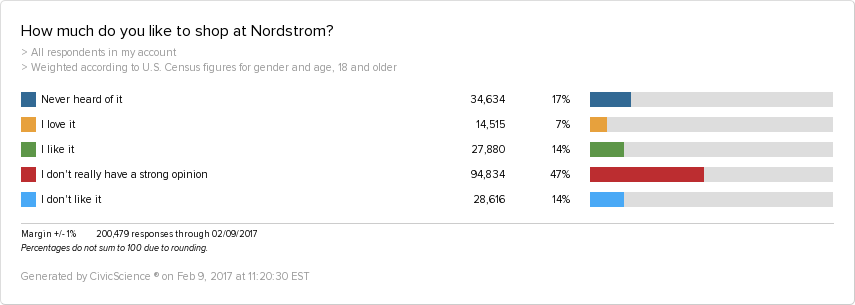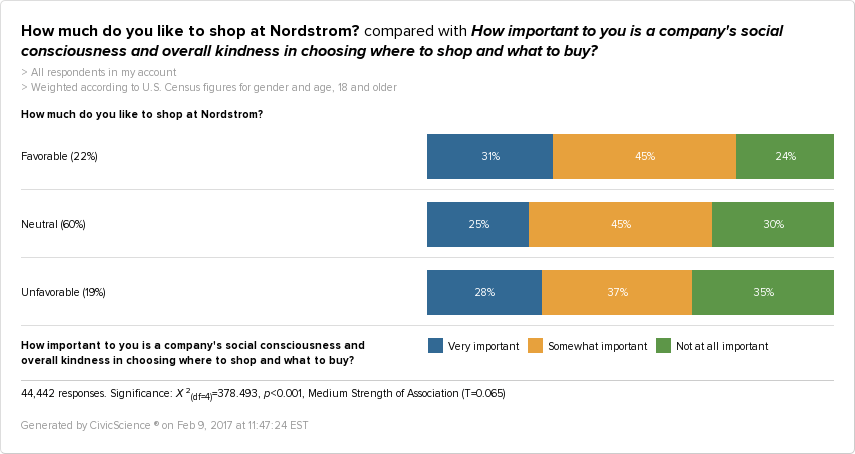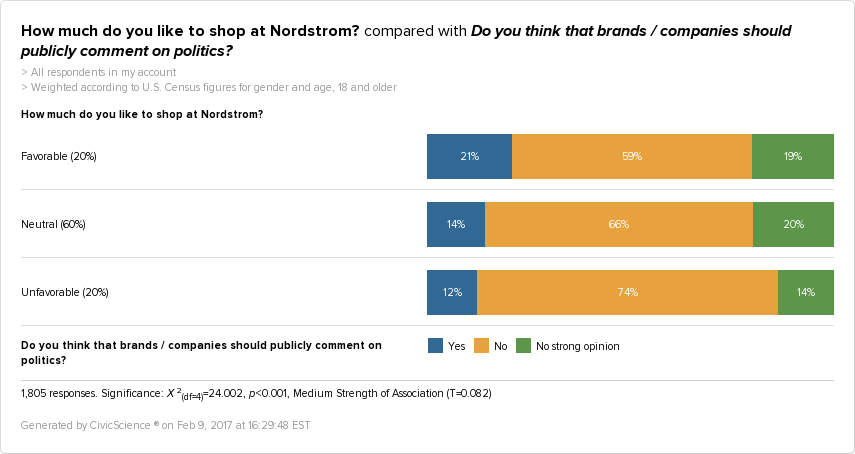Like it or not, we’re now in an era of brands and politics becoming one, even if it’s not spurred by the company itself. And Nordstrom experienced just that this week when President Donald Trump tweeted ill words about the over a century old retailer’s decision to drop his daughter’s line. Whether or not its move to drop Ivanka Trump’s shoes and apparel from its inventory was purely a sales-driven decision or a response to the Grab Your Wallet campaign – people are mad. Because we know that consumer opinion of shopping with a certain brand or store, for lack of a better term, trumps how much one spends there, we wanted to revisit the consumers who have a favorable opinion of shopping at Nordstrom. So, here’s a look at fans of Nordstrom, with the topline results below:

For the sake of this post, we’ve grouped answers by favorability, and we’ll focus on the 26% who either love or like shopping at Nordstrom, referring to them as Favorable.

Favorable Nordstrom shoppers are more likely to be women. They are also more likely to be between 18-34. We’ll get some other no-brainers out of the way: they are more likely to make $100k or more annually and reside in a city. They are more than the general population likely to:
- Go to the movies once a month or more
- Drink wine and coffee regularly
- Live in the US West
- Follow the NBA
- Watch TV dramas
- Rent the home they live in
- Be unmarried
Favorability over time
When analyzing the growth of Nordstrom favorability, our data show that people are 2x more likely to favor Nordstrom this winter than they were last winter. It’s promising to know what a difference a year made for the fanbase of Nordstrom, even with broader boycotts in the news and all over social media (starting in October) that included Nordstrom on the list of Trump retailers. What’s more is those who are favorable to Nordstrom are more likely than the general population to use social media heavily and say these platforms influence the clothing they buy.
So what does all of this mean (the high social media use of Nordstrom fans, the rise in brand favorability) given the current cycle of hashtag-trending boycotts? While these all are enacted in the social media space, and favorability rose so greatly for the brand over the past year…is this an indicator that Nordstrom shoppers are loyal and stick with their brand no matter what? Is there a limit to how many brands one can boycott? Does a tweet from the President do harm or good for brands overall? What will it do for Nordstrom? While we certainly don’t know all the answers, more thoughts on this later.
Political Ideology
Given the recent events surrounding the brand, what about ideology? Of those who are favorable to shopping at Nordstrom, they are slightly more likely to identify as Democrats than Republicans or Independents.

Backing that up, by an even bigger margin, looking at favorability vs. voting intent in the recent election, those favorable to Nordstrom were more likely to say they would probably or definitely vote for Hillary Clinton.
Social Consciousness

Of those favorable to Nordstrom, 76% say the above business practices are at all important to them. Will this come into play after Nordstrom’s decision to drop Ivanka Trump’s line? Will it increase favorability of the brand even more? What about speaking out on politics? Some brands can benefit from making this move, while others can’t. It looks like Nordstrom can. The graph below shows Nordstrom fans are slightly more likely than nonfans to say that brands / companies should publicly comment on politics:

Whether or not these political factors will affect the continued growth of those favorable to Nordstrom remains to be seen. And given the heavy social media usage of Nordstrom fans, and our data surrounding their political ideologies, it might only make favorability rise given the recent Twitter bashing of the company by President Trump. While Nordstrom was a retailer who carried Ivanka Trump products, it wasn’t fully in the boycott spotlight until the President himself brought it front and center. It’s only a matter of time until we see which way this goes. And, as we’re still in somewhat of unchartered territory in this new era of brand politics, we’ll continue to track Nordstrom’s favorability and report back if and when we see a change.








